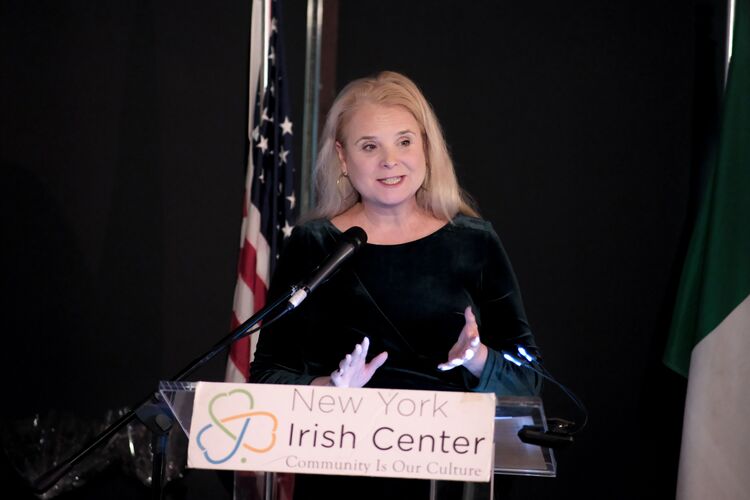Jeffrey Bean, left, and Cillian Hegarty in “Dublin Carol.” PHOTOS BY CAROL ROSEGG
By Orla O’Sullivan
As “Dublin Carol” opens, John (Jeffrey Bean) and his young helper Mark (Cillian Hegarty) are just in the door of the office of a funeral home in Dublin, having conducted a service that morning. It’s Dec. 24, 1999. John, who is about 50, is complimenting the young man on how well he did his part in the proceedings.
John is in the mood to talk and reluctant to let Mark get away. He makes tea for them both, while self-deprecatingly joking about those “always pushing tea on people.” He apologizes for holding forth to the younger man, whose contribution to the conversation is agreeable but minimal. John blames his chatty mood on a hangover he’s suffering. When first in the door he pours himself a drink, explaining he “needs it.” Yet his drinking in recent years, it seems, is under some control, not the destructive version of years earlier, when alcohol wrecked his home life. He hasn’t seen his wife or his now-grown daughter or son for a long time.
Years earlier, the owner of the business, now sick and incapacitated in the hospital, gave to John, then lost in heavy drinking and close to homelessness, a job at the funeral home. He is when emotional speaking about the owner. “The nurses are grand,” he says, but still it pains him to see the man who gave him second chance so helpless in bed.

Sarah Street in “Dublin Carol.”
But in general his conversation is light and witty. The playwright Conor McPherson delivers in this play, which originally opened in London in 2000 when he was 29, his usual credible, entertaining and revealing dialogue. At one point John passes his hand over his baldpate while speaking admiringly of the “tinkers”, who, he contends, manage to keep their hair by rarely washing it, thereby enabling the rich oils to work their hair-preserving magic.
Finally, he gives Mark license to leave and he follows soon afterwards. Scene two opens, after what appears to be a few hours time, with John entering the office again, this time accompanied by a young woman, Mary (Sarah Street), who, after a bit, we realize is his long-estranged daughter. Mary is there to tell him that her mother, his wife, is in the hospital and close to death. The daughter suggests her father visit the mother — and even agree to do her funeral. John is not inclined to do either.
He is clearly very uncomfortable in his daughter’s presence and demonstrates this by drinking heavily during the short time she’s there with him in the office. She, meanwhile, seems unaccountably at ease given their long separation. She brings up his failings as a father but is rather matter of fact about them. John, though, becomes overwrought, clearly tormented by guilt. He thrashes about, alternating between defending and condemning himself.
Though Christmas Eve is, of course, a celebrated occasion for tortured misgivings regarding family, the shift in emotional tenor from the first scene to the second is jarring and not quite plausible. And we miss the easy and entertaining conversation of scene one.
The final scene, however, which starts with our man packing away the few holiday decorations that adorn the back office of the funeral home – suggesting he’s trying to wrap up Christmas and the painful feelings associated with it – ends on a satisfying note, for this viewer at least. “Dublin Carol” is not first-order Conor McPherson, but it offers many of the usual pleasures for which the reliably first-rate playwright is famous.
“Dublin Carol,” which is directed by Ciarán O’Reilly, is playing at the Irish Repertory Theatre on 132 West 22nd St., until Nov. 10, is directed by O’Reilly. Box Office: 212.727.2737; www.irishrep.org.









